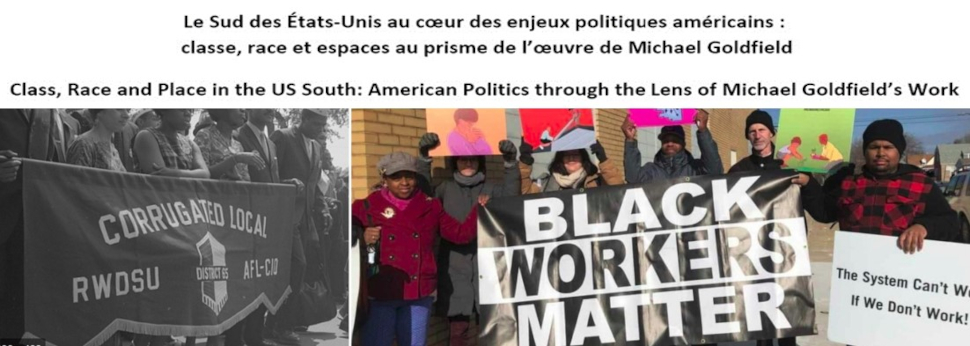
Conference topicsClass, Race and Place in the US South: American Politics through the Lens of Michael Goldfield’s Work Recent events in the United States remind us to what extent the South is both a place of distinctive identities and a space sharing a common heritage. According to the political scientist Michael Goldfield, “The South is a distinctive, atypical part of the United States; it is also, however, America writ large”" (Goldfield, 2020). These specificities are inscribed in social, cultural, political and, according to the author, above all economic structures, in a configuration that makes any definition of the “South” problematic (Odum, 1936; Kirby, 1983; Goldfield, 2020). Still, however the South is defined, the ways class and race relations intertwine in that space requires a close attention for one to understand American political life, especially at decisive historical moments, when their articulation or competition is at stake. According to Goldfield, white supremacy and issues of race are at the center of every critical turning point in American political history: the colonial era, the Revolutionary War and the Constitution, the Civil War and Reconstruction, the defeat of Populism and the System of 1896; the Great Depression and the New Deal; the civil rights movement (Goldfield, 1997). On the occasion of the release of Michael Goldfield’s latest book, The Southern Key (2020) we want to address these issues during an international symposium in the presence of the author. In this book, Goldfield specifically investigates the consequences of the 1930s economic crisis which gave birth to the American welfare state and a mass labor movement. But was it the advent of the New Deal that enabled a wave of industrial unionization, or rather the opposite, as Goldfield argues? The new balance of powers led President Roosevelt to build a large political coalition combining the left wing of the Democratic Party, unions, black activist groups, the majority of Marxist organizations, socialists, and Christian humanists. Nevertheless, if central themes like the fight for social and racial justice unified them, they soon became points of contention, as when the failure to unionize the South prevented the extension of the progressive values of the New Deal to the entire country. At different times in American history, various attempts to reconfigure these social structures were made, for instance during labor organizing campaigns in the South before and after WWII, or during Student Nonviolent Coordinating Committee campaigns after 1960. These critical turning points constitute “missed opportunities” (Korstad, Lichtenstein, 1988; Griffin, Korstad, 1995; Korstad, 2008) that could have changed the course of history, which Goldfield argues in a counterfactual analysis. In particular, Goldfield suggests that interracial unionization of the South, a strategy abandoned by union leadership, could have changed the nature of the civil rights movement by fostering an alliance with white workers. More widely, for Michael Goldfield, “the failure during the 1930s, 1940s and 1950s of organized labor to fully unionize the main Southern industries (whose successes, I will argue, would have had the potential to radically transform the South and, thus, the nation as a whole), a central factor in our understanding of America today” (Goldfield, 2020). For this conference, we propose three different angles of approach: the interaction between race, class and capital; the spatial dimension of these interactions; the causes for and the perpetuation of racism in the United States. These themes require an epistemological reflection on the various explanatory paradigms employed by historians, sociologists, political scientists, or specialists in cultural studies, whose methodologies and conclusions differ. Presentations will approach the following themes:
|

